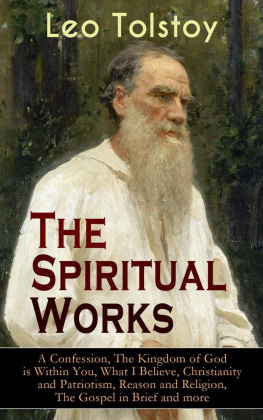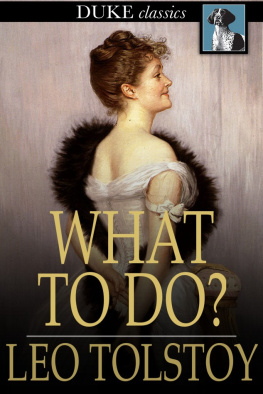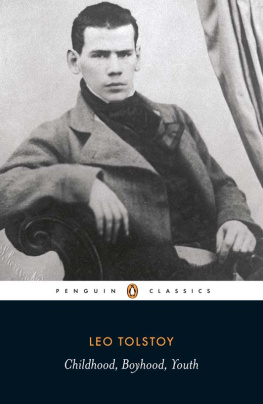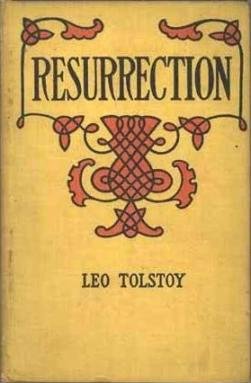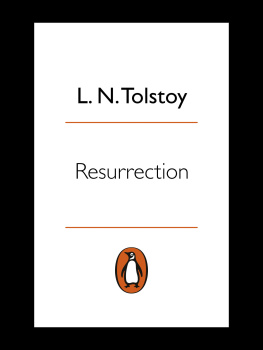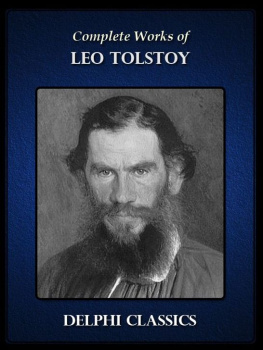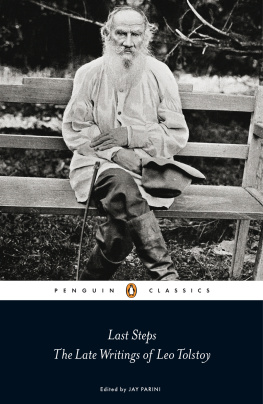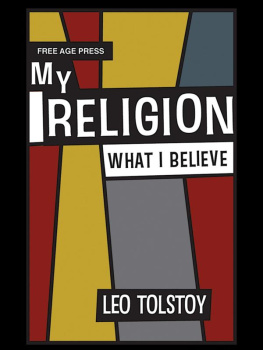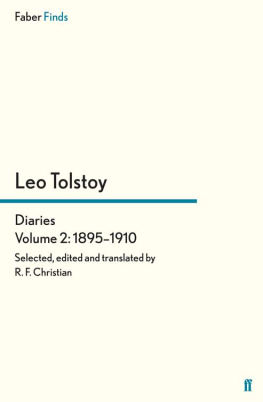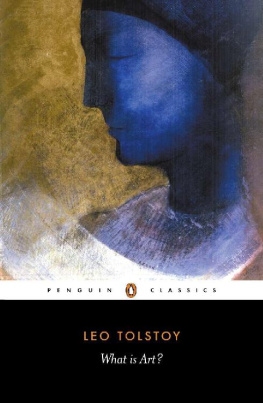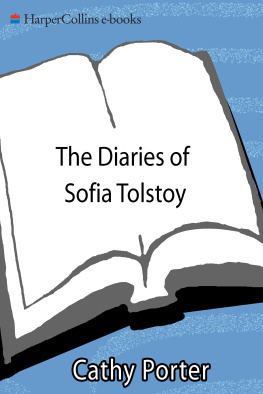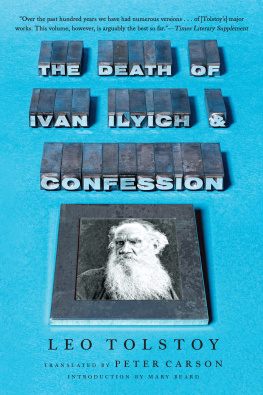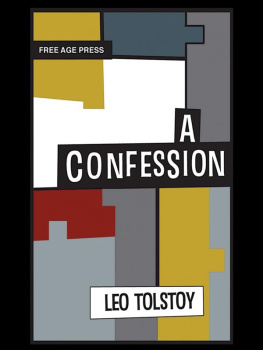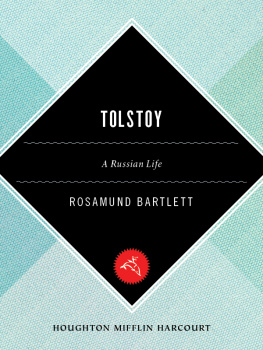Leo Tolstoy
The Spiritual Works of Leo Tolstoy: A Confession, The Kingdom of God is Within You, What I Believe, Christianity and Patriotism, Reason and Religion, The Gospel in Brief and more
Lessons on What it Means to be a True Christian From the Greatest Russian Novelists and Author of War and Peace, Anna Karenina and The Death of Ivan Ilyich
Translator: Leo Wiener, Constantine Popoff, Louise Maude, Aylmer Maude, V. Tchertkoff, Nathan Haskell Dole
e-artnow, 2016
Contact:
ISBN 978-80-268-5246-9
Table of Contents
Introduction
Leo Tolstoy: A Short Biography
by Aylmer Maude
COUNT LEO TOLSTOY was born 28th August 1828 [in the Julian calendar then used in Russia; 9th September 1828 in todays internationally accepted Gregorian calendar], at a house in the country not many miles from Tola, and about 130 miles south of Moscow.
He has lived most of his life in the country, preferring it to town, and believing that people would be healthier and happier if they lived more natural lives, in touch with nature, instead of crowding together in cities.
He lost his mother when he was three, and his father when he was nine years old. He remembers a boy visiting his brothers and himself when he was twelve years old, and bringing the news that they had found out at school that there was no God, and that all that was taught about God was a mere invention.
He himself went to school in Moscow, and before he was grown up he had imbibed the opinion, generally current among educated Russians, that religion is old-fashioned and superstitious, and that sensible and cultured people do not require it for themselves.
After finishing school Tolstoy went to the University at Kazn. There he studied Oriental languages, but he did not pass the final examinations.
In one of his books Tolstoy remarks how often the cleverest boy is at the bottom of the class. And this really does occur. A boy of active, independent mind, who has his own problems to think out, will often find it terribly hard to keep his attention on the lessons the master wants him to learn. The fashionable society Tolstoy met at his aunts house in Kazn was another obstacle to serious study.
He then settled on his estate at Ysnaya Polyna, and tried to improve the condition of the serfs. His attempts were not very successful at the time, though they served to prepare him for work that came later. He had much to contend against in himself, and after three years he went to the Caucasus to economise, in order to pay off debts made at cards. Here he hunted, drank, wrote his first sketches, and entered the army, in which an elder brother to whom he was greatly attached was serving, and which was then engaged in subduing the native tribes.
When the Crimean War began, in 1854, Tolstoy applied for active service, and was transferred to the army on the frontier of European Turkey, and then, soon after the siege began, to an artillery regiment engaged in the defence of Sevastopol. His uncle, Prince Gortchakf, was commander-in-chief of the Russian army, and Tolstoy received an appointment to his staff. Here he obtained that first-hand knowledge of war which has helped him to speak on the subject with conviction. He saw war as it really is.
The men who governed Russia, France, England, Sardinia, and Turkey had quarrelled about the custody of the Holy Places in Palestine, and about the meaning of two lines in a treaty made in 1774 between Russia and Turkey.
They stopped at home, but sent other people most of them poorly paid, simple people, who knew nothing about the quarrel to kill each other wholesale in order to settle it.
Working men were taken from Lancashire, Yorkshire, Middlesex, Essex, and all parts of England, Scotland, Wales, Ireland, France, and Sardinia, and shipped, thousands of miles, to join a number of poor Turkish peasants in trying to kill Russian peasants. These latter had in most cases been forced unwillingly to leave their homes and families, and to march on foot thousands of miles to fight these people they never saw before, and against whom they bore no grudge.
Some excuse had, of course, to be made for all this, and in England people were told the war was in defence of oppressed nationalities.
When some 500,000 men had perished, and about 340,000,000 had been spent, those who governed said it was time to stop. They forgot all about the oppressed nationalities, but bargained about the number and kind of ships Russia might have on the Black Sea.
Fifteen years later, when France and Germany were fighting each other, the Russian Government tore up that treaty, and the other Governments then said it did not matter. Later still, Lord Salisbury said that in the Crimean War we put our money on the wrong horse. To have said so at the time the people were killing each other would have been unpatriotic. In all countries truth, on such matters, spoken before it is stale, is unpatriotic.
When the war was over Count Tolstoy left the army and settled in Petersburg. He was welcome to whatever advantages the society of the capital had to offer, for not only was he a nobleman and an officer, just back from the heroic defence of Sevastopol, but he was then already famous as a brilliant writer. He had written short sketches since he was twenty-three, and while still young was recognised among Russias foremost literary men.
He had, therefore, fame, applause, and wealth and at first he found these things very pleasant. But being a man of unusually sincere nature, he began in the second, and still more in the third, year of this kind of life, to ask himself seriously why people made such a fuss about the stories, novels, or poems, that he and other literary men were producing. If, said he, our work is really so valuable that it is worth what is paid for it, and worth all this praise and applause it must be that we are saying something of great importance to the world to know. What, then, is our message? What have we to teach?
But the more he considered the matter, the more evident it was to him that the authors and artists did not themselves know what they wanted to teach that, in fact, they had nothing of real importance to say, and often relied upon their powers of expression, when they had nothing to express. What one said, another contradicted, and what one praised, another jeered at.
When he examined their lives, he saw that, so far from being exceptionally moral and self-denying, they were a more selfish and immoral set of men even than the officers he had been among in the army.
In later years, when he had quite altered his views of life, he wrote with very great severity of the life he led when in the army and in Petersburg. This is the passage it occurs in My Confession : I cannot now think of those years without horror, loathing, and heart-ache. I killed men in war, and challenged men to duels in order to kill them; I lost at cards, consumed what the peasants produced, sentenced them to punishments, lived loosely, and deceived people. Lying, robbery, adultery of all kinds, drunkenness, violence, murder there was no crime that I did not commit; and people approved of my conduct, and my contemporaries considered, and consider me, to be, comparatively speaking, a moral man.
Many people forgetting Tolstoys strenuous manner of writing, and the mood in which My Confession was written have concluded from these lines that as a young man he led a particularly immoral life. Really, he is selecting the worst incidents, and is calling them by their harshest names: war and the income from his estate are murder and robbery. In this passage he is like John Bunyan and other good men before him denouncing rather than describing the life he lived as a young man. The simple fact is that he lived among an immoral, upper-class, city society, and to some extent yielded to the example of those around him; but he did so with qualms of conscience and frequent strivings after better things. Judged even as harshly as he judges himself, the fact remains that those among whom he lived considered him to be above their average moral level.

